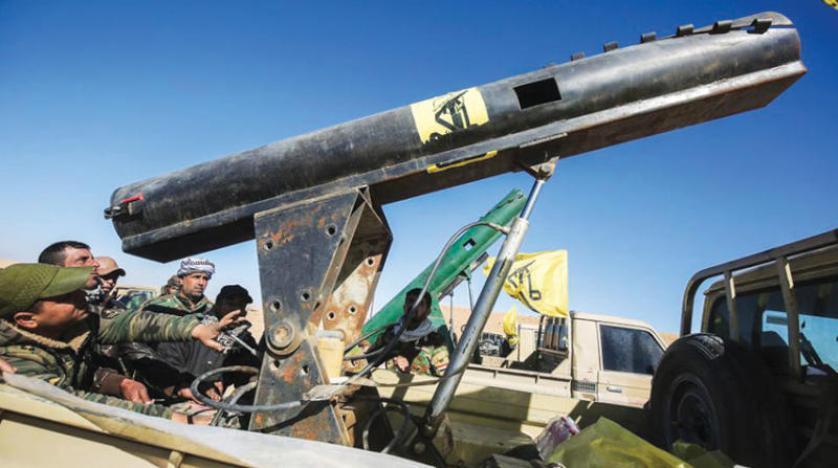Iranian militias have given the green light to activate the air defence system composed of four batteries in Damascus to intercept any upcoming Israeli strikes, reliable sources in Syria said, according to an article in Asharq Al-Awsat.
The Iranian militias exploited the earthquake that hit parts of Syria and the access to humanitarian aid to deliver the air defence system to the regime, the newspaper quotes the Syrian Observatory for Human Rights (SOHR) as saying. SOHR added that the Iranian system had passed through the al-Boukamal crossing on the Syrian-Iraqi border.
The cost of the Iranian system is less than that of the Russian S-300 missile system and more Iranian missiles are expected to be placed at the security and military sites in Aleppo, Lattakia and Deir-ez-Zor.
SOHR also said that Iranian militias’ leaders were recently ordered to limit their movement in Syrian territories, fearing Israeli strikes.
Turkey angry of over top general’s Syria visit, summons ambassador
Turkey summoned U.S. ambassador Jeff Flake on Monday to convey its discomfort about the top U.S. general’s visit to northeast Syria over the weekend, a foreign ministry source said.
Army General Mark Milley, chairman of the Joint Chiefs of Staff, visited on March 4 to review a nearly eight-year-old U.S. mission to an area controlled by the U.S.-allied Syrian Democratic Forces (SDF).
Turkey sees the People’s Protection Units (YPG), the spearhead of the SDF, as the Syrian wing of the outlawed separatist Kurdistan Workers’ Party (PKK) and considers both terrorist organizations.
The United States and the European Union have also designated the PKK as a terrorist group, but not the YPG.
Amnesty accuses SNA, Syrian government of ‘politicizing’ quake aid
The Syrian government and Turkey-backed rebel forces have blocked more than 100 trucks carrying humanitarian aid from entering two zones in Aleppo province hit by last month’s deadly earthquake, Amnesty International said on Monday.
The aid, which included food, medical supplies, tents and fuel, was sent by Kurdish authorities, the rights group said.
It said the Syrian government had prevented 100 trucks carrying food, medical supplies and tents from entering Kurdish-majority areas of Aleppo city.
To the north, rebels blocked 30 trucks of fuel and other help from entering Afrin, an enclave Turkish forces and allied rebels have held since they pushed out Kurdish fighters in 2018.
Those regional hostilities have largely stayed in place since the disaster, prompting accusations that life-saving aid was being politicized.
“These politically motivated obstructions of critical aid have had tragic ramifications, especially for search and recovery teams who need fuel to operate machinery,” said Aya Majzoub, Amnesty International’s deputy director for the Middle East and North Africa.
Majzoub said all sides of the conflict should ensure that civilians “have unfettered access to aid.”
The United Nations and other humanitarian organizations have also criticized hardline Islamist forces in the north for blocking aid coming from government-held zones.
Iran official, Pedersen, discuss facilitating sending of humanitarian aid to Syria
Iranian Foreign Minister’s Senior Advisor for Special Political Affairs Ali Asghar Khaji discussed during a telephone conversation with the UN Special Envoy for Syria, Geir Pedersen, facilitating sending of humanitarian aid to the Syrian people after the recent earthquake and avoiding politicizing in this regard.
According to SANA, the pair reviewed the latest political developments and the humanitarian situation in Syria, especially the consequences and damage of the recent earthquake.
Opposing the sanctions and obstacles in sending humanitarian to the earthquake victims, Khaji called for an increase and acceleration in the transfer of unconditional international humanitarian aid to Syria.
Health Ministry, UNOPS in Jordan discuss means to support health sector
Syrian Minister of Health, Dr. Hassan al- Ghobash, discussed with the Director of the United Nations Office for Project Services in Jordan (UNOPS), Mohammed Othman Akram, means to enhance cooperation in response to the earthquake disaster and the support for the immediate needs of the health sector, SANA reported.
That came during a meeting held Monday at the building of the Health Ministry.
“The relations between the office and the Ministry are deep-rooted, and the support is not limited to the response to the earthquake disaster, as coordination is ongoing,” Dr. al-Ghobash said.
The Health Minister added that the earthquake has greatly affected the health sector, and priorities must be renewed to restore things to normal.
In turn, Akram affirmed the office’s readiness to support the immediate needs of the health sector and to enhance cooperation in terms of financing to support solar energy in hospitals and health centers, in addition to the old projects that are being worked on to secure the required health services to citizens.


